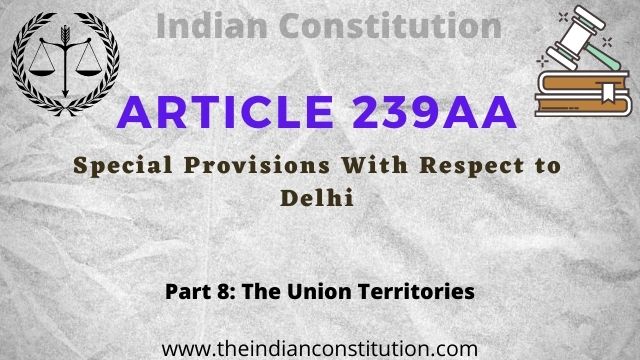Context
-
Recently, the Supreme Court interpreted Article 239AA of the Constitution, the provision that deals with the governance structure of Delhi, as one that underlies the principles of federalism, participatory democracy, and collective responsibility.
What is Article 239AA of the Constitution?
- Inserted into the Constitution by the 69th Amendment Act, 1991, Article 239AA conferred special status on Delhi following the recommendations of the S Balakrishnan Committee that was set up in 1987 to look into Delhi’s demands for statehood.
- According to this provision, the NCT of Delhi will have an administrator and a Legislative Assembly.
- Subject to the provisions of the Constitution, the Legislative Assembly, “shall have the power to make laws for the whole or any part of the NCT with respect to any of the matters in the State List or Concurrent List in so far as any such matter is applicable to Union territories,” except on the subjects of police, public order, and land.

- Two Constitution Benches of the Supreme Court, in July 2018 and May 2023, have dealt with the issue of the powers of the Delhi government.
- Both of these judgments involve the interpretation of Article 239AA of the Constitution, which deals with the governance structure of the national capital. In 1991, when Article 239 AA was inserted, the Parliament also passed the Government of National Capital Territory of Delhi Act, 1991, to provide a framework for the functioning of the Assembly and the government of Delhi.
What has the Supreme Court said about Article 239AA?
- In the majority ruling in 2018, the Constitution bench held that although Delhi could not be accorded the status of a state, the concept of federalism would still apply to it.
- The 2018 ruling said that with the introduction of Article 239AA in the Constitution, Parliament envisaged a “representative form of Government” for Delhi while seeking to provide a directly elected Legislative Assembly with legislative powers over matters within the State List and the Concurrent List, barring those exempted. It also sought to mandate the Lieutenant Governor to act on the aid and advice of the Council of Ministers, except when he decides to refer the matter to the President for a final decision.
- Article 239AA(3), the court said that it revealed Parliament’s power to make laws for Delhi, for matters given in the State and Concurrent List. At the same time, the Legislative Assembly of Delhi also has the power to make laws over all those subjects which figure in the Concurrent List and all, but three excluded subjects, in the State List.
- Adding that the Centre has exclusive executive power with respect to Delhi over its police, land, and public order, the court clarified that “in respect of other matters, the executive power is to be exercised by the Government of NCT of Delhi”. This, however, is subject to the proviso to Article 239AA(4) of the Constitution.
- The proviso to Article 239AA says that in case of a difference of opinion between the LG and the ministers, the LG shall refer the matter to the President for a decision and act according to it. However, the court said that even this difference of opinion should have a “sound rationale”. “Such an interpretation would be in consonance with the concepts of pragmatic federalism and federal balance by giving the Government of NCT of Delhi some required degree of independence subject to the limitations imposed by the Constitution,”
- The court also made it clear that the LG has not been entrusted with any independent decision-making power and that “he has to either act on the ‘aid and advice’ of the Council of Ministers or he is bound to implement the decision.” Further, the LG should not act in a mechanical manner without due application of mind and refer every decision of the Council of Ministers to the President.
- Referring to Article 239AA as a provision that makes the “executive power of the Government of NCTD” coextensive with the “legislative power of the Delhi Legislative Assembly”, the court clarified that the power of the Council of Ministers of Delhi spans all subjects in the Concurrent List and all but three excluded subjects in the State List. “However, if Parliament makes law in respect of certain subjects falling in the State List or the Concurrent List, the executive action of the State must conform to the law made by the Parliament.
- Article 239AA represents a clear mandate of the Constitution to provide institutional governance founded on participatory, representative, and responsive government.
- The Bench held that NCTD (Delhi), just like other states, “represents the representative form of government”. However, it outlined that “the involvement of the Union of India in the administration of NCTD is limited by constitutional provisions, and any further expansion would be contrary to the constitutional scheme of governance.”
Source: IE
Visit Abhiyan PEDIA (One of the Most Followed / Recommended) for UPSC Revisions: Click Here
IAS Abhiyan is now on Telegram: Click on the Below link to Join our Channels to stay Updated
IAS Abhiyan Official: Click Here to Join
For UPSC Mains Value Edition (Facts, Quotes, Best Practices, Case Studies): Click Here to Join
